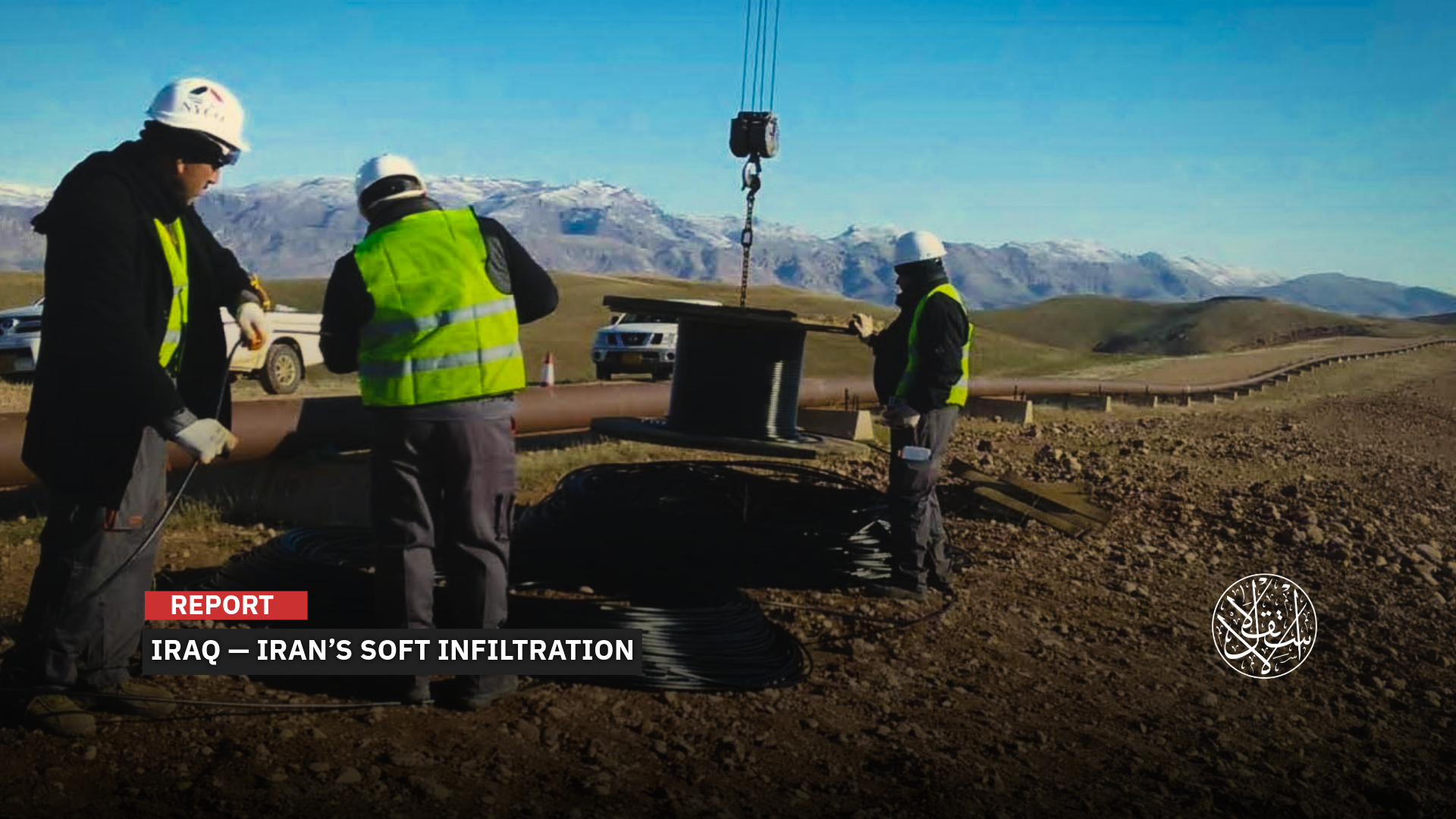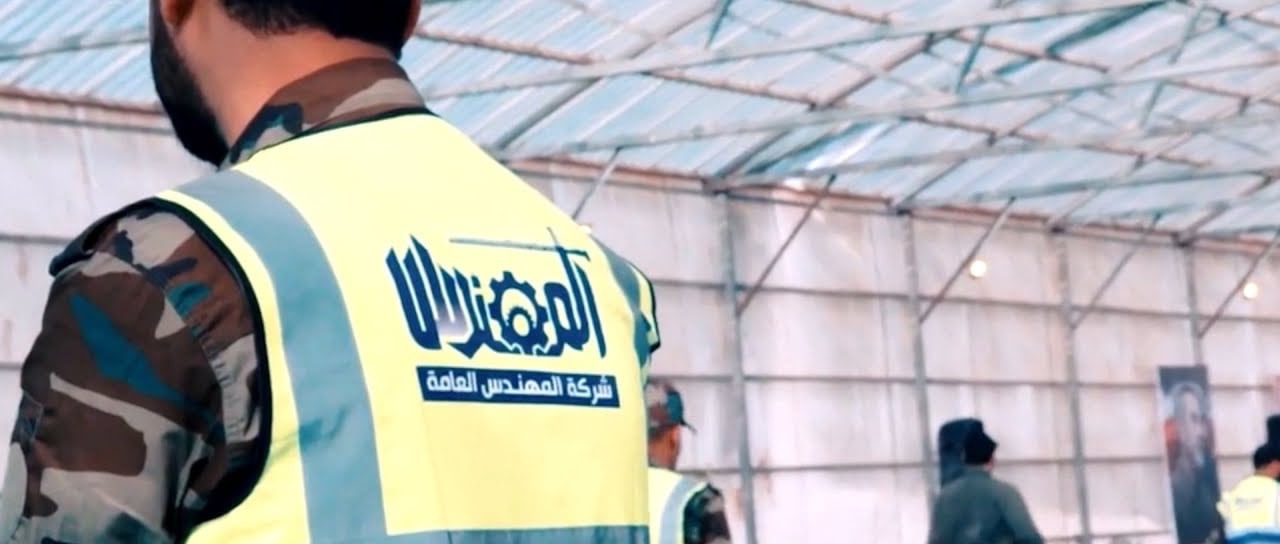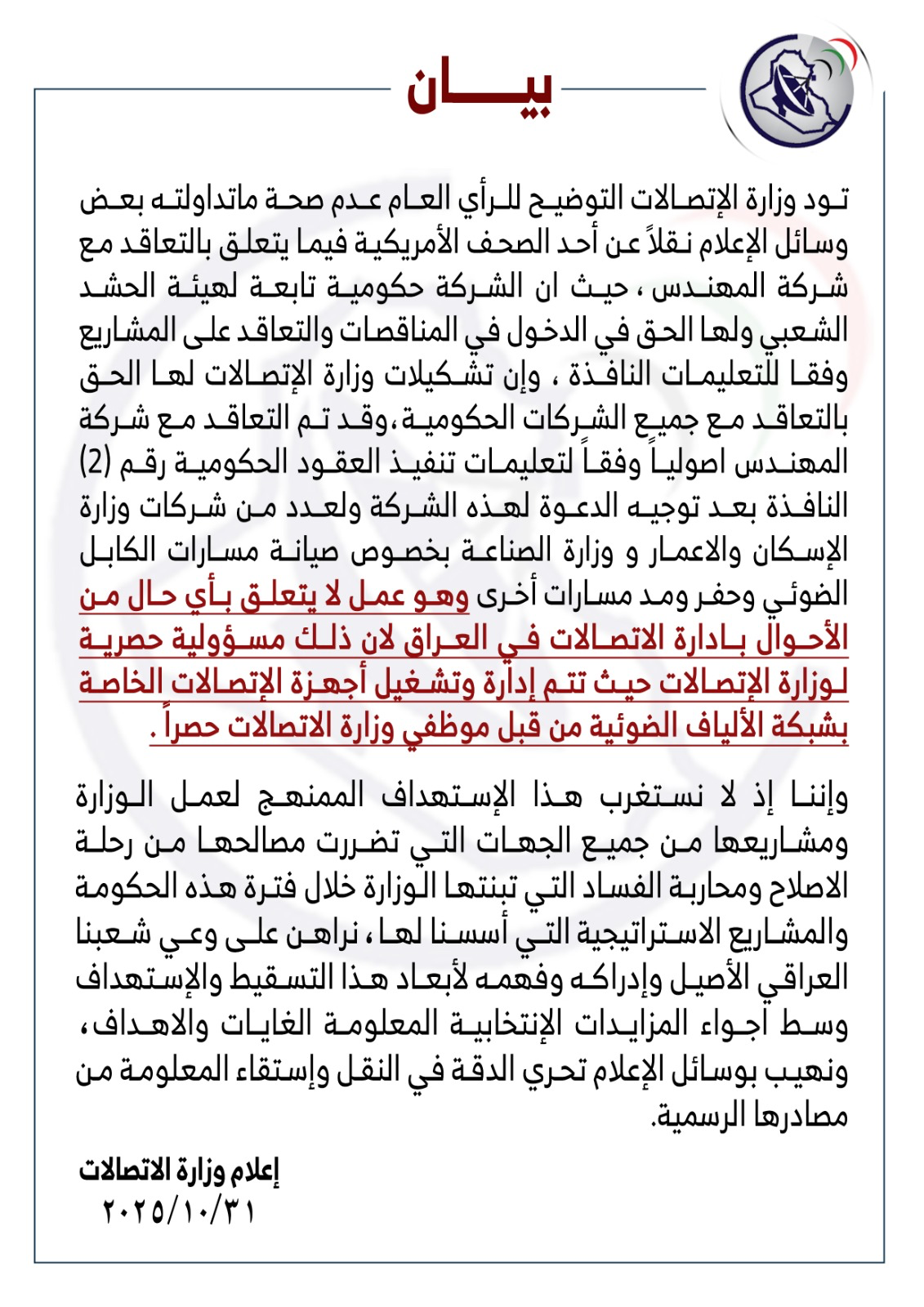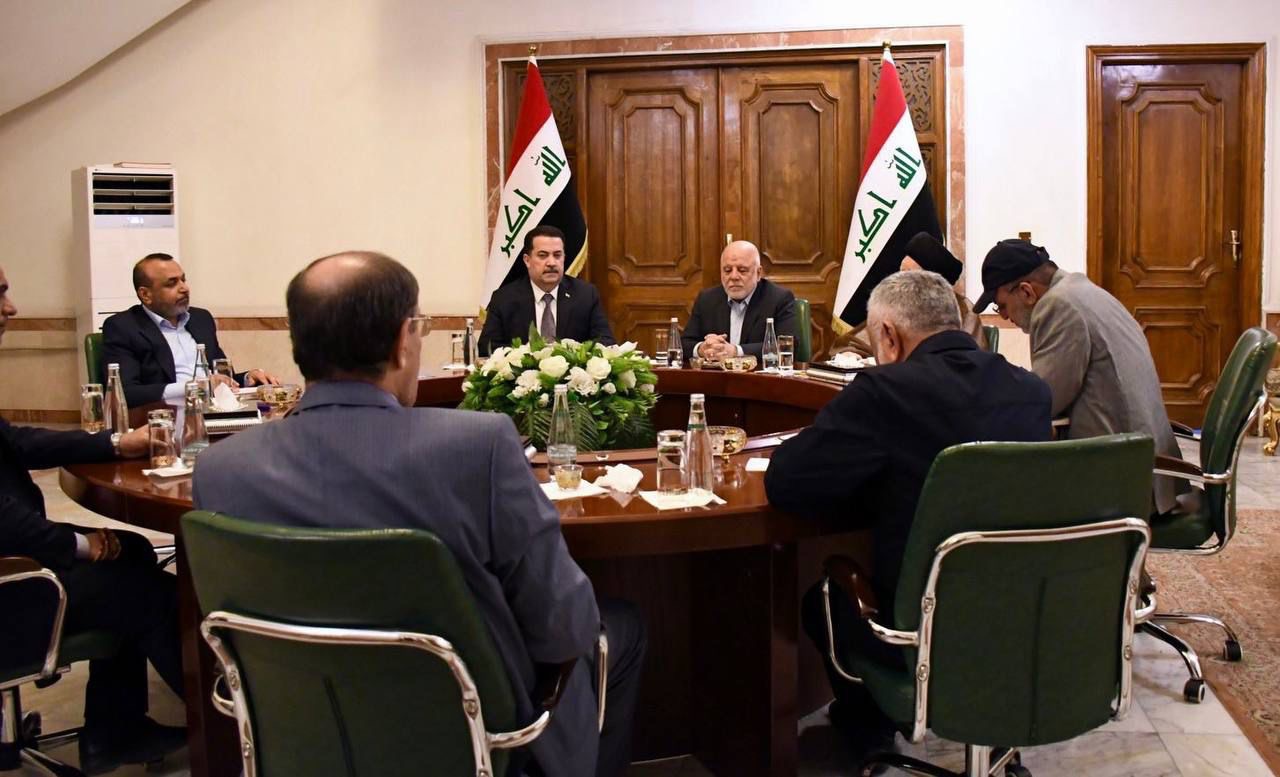Iran’s Militias Seize Iraq’s Telecom Network: What Does It Mean for the Country’s Future?

The Iraqi Ministry of Communications confirmed that it had contracted the company “al-Muhandis” to lay internet cables.
Western media outlets have warned about the growing influence of Iran-backed militias over Iraq’s telecommunications sector, which could give them control of the national database. This comes after the Popular Mobilization Forces-affiliated company “al-Muhandis” was granted contracts to build and maintain this vital infrastructure.
These warnings have raised questions about whether telecommunications are becoming a new arena of political and security influence for Iran-aligned groups and whether official dealings with U.S.-sanctioned entities could isolate the sector internationally, especially if cooperation with Western tech companies is involved.

Uncovering the Hidden Truth
In a development that could push Iraq back to square one, The Atlantic revealed that the Iraqi Ministry of Communications has signed direct contracts with the Popular Mobilization Forces and its affiliated company “al-Muhandis,” covering the maintenance of the fiber-optic network and the construction of a new parallel system.
According to the report published on October 28, 2025, these previously undisclosed contracts grant the militias something they have long sought: control over Iraq’s data network.
The magazine cited Iraqi officials and telecommunications workers, who spoke on condition of anonymity, saying the deals are deeply concerning—not only for the opportunities they create for illicit profit but also for serious security risks, as militias or their Iranian backers could use control of the network to monitor anyone inside Iraq.
In a related context, the magazine reported that Prime Minister Mohammed Shia’ al-Sudani recently attempted to approve an exclusive 5G mobile network contract for a coalition linked to the Popular Mobilization Forces, but a Supreme Court judge blocked the move, arguing that the deal raised national security concerns and might not remain suspended indefinitely.
The report described Iraq as Iran’s last remaining ally in the Middle East, saying Baghdad has become Tehran’s lifeline after the Ministry of Communications granted the al-Muhandis company a contract to maintain the fiber-optic network and build a new one across the country.
It also accused the prime minister of embracing these militias and providing them with financial backing, noting that government contracts have been distributed at an accelerated pace and that a new state-owned company, the al-Muhandis General Company, was created. The U.S. Treasury has sanctioned this company for serving as a front for “terrorist” groups.
The magazine added that al-Sudani portrays himself as a pragmatist, emphasizing that Iraq shares a long border with Iran and must balance the interests of this powerful neighbor against those of an even more powerful partner in Washington.
It stressed that U.S. President Donald Trump has paid little attention to Iraq since returning to the White House in early 2025, but the Treasury Department’s recent decision to sanction the al-Muhandis company and other entities has sparked concern among corrupt networks in Baghdad.
On October 9, the U.S. Treasury imposed sanctions on the al-Muhandis, the economic arm of the Popular Mobilization Forces, in a move aimed at dismantling corruption and money-laundering networks that enable armed groups to operate inside and beyond Iraq.
The Treasury explained that Kataib Hezbollah, one of the most powerful factions within the Popular Mobilization Forces, established al-Muhandis General Company for Construction, Agriculture, and Industry as an economic front for its activities.
It stated that the company is controlled by Abdul-Aziz al-Mohammadawi, known as Abu Fadak, the chief of staff of the Popular Mobilization Forces, who has exploited government contracts to divert state funds into commercial fronts to finance militia operations and weapons smuggling in coordination with Iran’s Revolutionary Guard Corps.

Official Response
At the official level, Iraq’s Ministry of Communications responded to the Atlantic’s report by saying that al-Muhandis is a state-owned company affiliated with the Popular Mobilization Forces and that it has the right to bid for contracts and undertake projects, noting that ministry entities may contract with any government-owned firms.
In a statement dated October 31, the ministry said the deal with al-Muhandis was carried out according to government contracting procedures, after invitations were issued to that company and several others by the Ministry of Housing and Reconstruction and the Ministry of Industry to tender for fiber-optic cable maintenance and the excavation and laying of additional routes.
The ministry stressed that the company’s work does not in any way amount to managing Iraq’s communications, asserting that the operation and management of the fiber-optic network devices remain exclusively the responsibility of ministry staff.
The controversy erupted alongside reports that a number of Iraqi activists have closed their social media accounts, vanished online, or published apologies directed primarily to Iran-aligned militias or to certain political and religious figures, according to Iraqi journalist Othman Mukhtar.
In a post on X on October 29, Mukhtar said provincial actors loyal to Iran have come to control key parts of the Ministry of Communications, the Communications and Media Commission, national security structures, and even local internet service providers.
He warned against underestimating the cyber capabilities these actors have developed, whether by breaching Iraqi institutions or by using offices that track and pursue activists and dissidents.
Mukhtar said these capabilities accelerated after February 2023, when many of their members were sent to Moscow for expensive training courses with Russian tech firms, and that they now field advanced hacker teams specializing in tracking and intrusion.
He added that one of the main ways authorities can reveal the locations and identities of activists is by submitting requests to Meta and X accompanied by court orders or official security decisions.
Mukhtar added that Meta has recently complied with several of these requests as part of its standard protocol for cooperating with government and security agencies around the world, providing them with users’ connection logs, IP addresses, registered phone numbers, and email addresses.
He explained that the second method involves the use of specialized tools and applications that allow access to accounts and data analysis. The most dangerous aspect, he warned, lies in the private photos users take with their phones, which contain embedded metadata such as EXIF or GPS information, or even visual clues within the images themselves.
Addressing Iraqi activists, Mukhtar advised them to use a VPN every time they log in to accounts that contain content opposing the militias or Iran and to avoid sharing any personal information on active accounts. “People are not interested in your private life,” he said. “What matters is your stance, your opinion, and the truth you share.”

Leak Wars
Commenting on whether the Iraqi authorities might withdraw the contract with al-Muhandis to avoid international isolation in the telecommunications sector, Iraqi affairs researcher Hamed al-Obaidi said that if Western media had not exposed the deal, things would have proceeded as usual and the Iran-backed militias would have taken control. “Now that it has been revealed, the Iraqi government finds itself embarrassed,” he said.
“The current government’s term has ended, and the incoming administration, to be formed after the parliamentary elections on November 11, will have to address the issue,” al-Obaidi told Al-Estiklal.
“I believe the new government will definitely cancel the contract, since Washington will have the final say in choosing the next prime minister, who is expected to be aligned with U.S. interests.”
“The next Iraqi government will not reject any U.S. requests, especially those related to groups and militias under sanctions, and will likely push them out of the political and economic scene in order to avoid angering the current U.S. administration led by Donald Trump,” he added.
“The attempt to control the communications sector followed a wave of leaks among Shiite political factions, with those groups targeting each other and accusing Prime Minister Mohammed Shia’ al-Sudani of forming an espionage network against them.”
Al-Obaidi emphasized that Iran-aligned militias use control over telecommunications to spy on and recruit their opponents by leaking phone calls, tracking activists, and operating social media accounts that publish scandals under fake identities.
On August 20, 2024, Iraqi judicial authorities announced the arrest of Mohammed Juhi, deputy director of the administrative department in the Prime Minister’s Office, on charges of leading a “spy network.” Members of the Shiite Coordination Framework also filed complaints against him, accusing him of monitoring their communications.
Meanwhile, a surge of leaks targeting Iraqi government officials and advisers has surfaced, exposing corruption deals and commissions linked to facilitating investment contracts in ministries, some of which allegedly included shares for Prime Minister al-Sudani himself.
One of the most prominent leaks was an audio recording circulated in late November 2024, allegedly featuring Yazan Mashaan al-Jubouri, an adviser to the prime minister, demanding a commission in exchange for al-Sudani’s signature on a Ministry of Electricity contract, with a “share” reserved for the prime minister and his political bloc, the Furatayn Movement.
Another leak that sent shockwaves through Iraq’s public and political circles was attributed to Iraqi politician Khamis al-Khanjar. In the recording, he complains to Prime Minister Mohammed Shia’ al-Sudani about irregularities within the Sunni Endowment’s Investment Department, particularly the sale of certain properties.
In the audio clip, circulated by Iraqi media outlets and on social media on November 11, 2024, al-Khanjar accuses Abdul Samad, the son of current Parliament Speaker Mahmoud al-Mashhadani, of trying to seize control of the Sunni Endowment’s investment division, a move that could pave the way for large-scale corruption and a major scandal.
Three days earlier, another leaked audio recording had surfaced, allegedly featuring Abdul Karim al-Faisal, head of the Prime Minister’s Advisory Board, expressing frustration that he received only one million dollars from an investment project, even though he was responsible for securing the approvals, while the remaining millions went to an unnamed minister.
Sources
- Iran’s Last Ally in the Middle East
- Statement by the Iraqi Ministry of Communications [Arabic]
- Corruption Leaks Surround al-Sudani’s Government in Iraq: Who Is Behind Them? [Arabic]
- The Iraqi Government Rejects U.S. Sanctions on al-Muhandis Company [Arabic]
- Washington Describes Iran’s Influence in Iraq as Malicious Amid Fears of Iraqi Data Leaks [Arabic]











